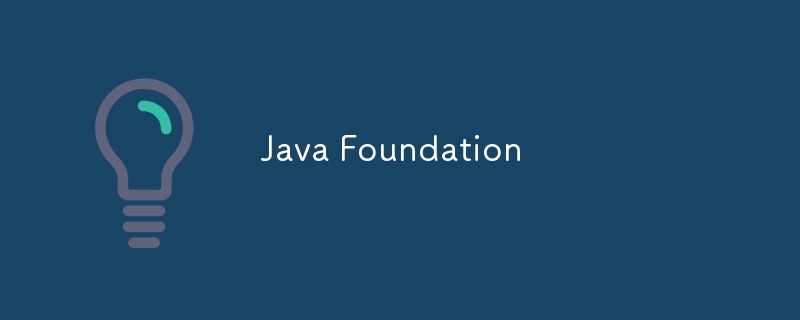Java Foundation
Jan 10, 2025 am 09:24 AM
What is Java
Java is a high-level, object-oriented, and platform-independent programming language. It is widely used for building web applications, mobile applications, enterprise software, and more. Its "write once, run anywhere" capability is powered by the Java Virtual Machine (JVM).
Key Characteristics of Java
- Platform Independence: Code written in Java can run on any platform with a JVM.
- Object-Oriented: It uses concepts like classes, inheritance, and polymorphism to structure programs.
- Robustness: Strong memory management and exception handling make Java less prone to crashes.
- Security: Features like a security manager and bytecode verification ensure secure execution.
- Multithreading: Java supports concurrent programming to run multiple tasks simultaneously.
- Rich Libraries: Extensive standard libraries for networking, file handling, and more.
JVM (Java Virtual Machine)
The JVM is a runtime environment that executes Java bytecode, making Java platform-independent. It interprets or compiles bytecode into machine code specific to the host system. It also handles memory management, garbage collection, and security checks.
JDK (Java Development Kit)
The JDK is a software development environment that provides tools for developing, debugging, and running Java applications. It includes the Java Compiler (javac), libraries, and the JRE (Java Runtime Environment).
Java Compiler (javac) and How It Works
The javac compiler translates Java source code (files with .java extension) into bytecode (files with .class extension). Bytecode is an intermediate, platform-independent representation of the program, which is then executed by the JVM.
JRE (Java Runtime Environment)
The JRE provides the libraries, JVM, and other components necessary to run Java applications. It does not include development tools like the compiler. It is intended solely for end-users who want to execute Java programs.
Variables
In Java, a variable is a container for storing data that can be used and manipulated within a program. Each variable has a type that defines the kind of data it can hold.
Example:
int age = 25; // An integer variable String name = "John"; // A string variable
Data Types
Data types define the type of data that a variable can store. Java is statically typed, so each variable must be declared with a data type.
Common Data Types:
Primitive: int, double, boolean, char, etc.
Non-Primitive: String, arrays, objects, etc.
Example:
int age = 25; // An integer variable String name = "John"; // A string variable
Concatenation
Concatenation in Java is the process of joining two or more strings or combining strings with other data types. The operator is commonly used for this purpose.
Example:
int number = 10; // Integer double price = 19.99; // Decimal number boolean isAvailable = true; // Boolean char grade = 'A'; // Character
Constants
Constants are variables whose values cannot be changed once assigned. In Java, the final keyword is used to declare constants.
Example:
String firstName = "Jane"; String lastName = "Doe"; String fullName = firstName + " " + lastName; // "Jane Doe" int age = 30; String message = "Age: " + age; // "Age: 30"
Summary Example
final double PI = 3.14159; final String WELCOME_MESSAGE = "Welcome to Java Programming"; // Uncommenting the line below will cause an error // PI = 3.14;
The above is the detailed content of Java Foundation. For more information, please follow other related articles on the PHP Chinese website!

Hot Article

Hot tools Tags

Hot Article

Hot Article Tags

Notepad++7.3.1
Easy-to-use and free code editor

SublimeText3 Chinese version
Chinese version, very easy to use

Zend Studio 13.0.1
Powerful PHP integrated development environment

Dreamweaver CS6
Visual web development tools

SublimeText3 Mac version
God-level code editing software (SublimeText3)

Hot Topics
 How does Java's classloading mechanism work, including different classloaders and their delegation models?
Mar 17, 2025 pm 05:35 PM
How does Java's classloading mechanism work, including different classloaders and their delegation models?
Mar 17, 2025 pm 05:35 PM
How does Java's classloading mechanism work, including different classloaders and their delegation models?
 Top 4 JavaScript Frameworks in 2025: React, Angular, Vue, Svelte
Mar 07, 2025 pm 06:09 PM
Top 4 JavaScript Frameworks in 2025: React, Angular, Vue, Svelte
Mar 07, 2025 pm 06:09 PM
Top 4 JavaScript Frameworks in 2025: React, Angular, Vue, Svelte
 How do I use Maven or Gradle for advanced Java project management, build automation, and dependency resolution?
Mar 17, 2025 pm 05:46 PM
How do I use Maven or Gradle for advanced Java project management, build automation, and dependency resolution?
Mar 17, 2025 pm 05:46 PM
How do I use Maven or Gradle for advanced Java project management, build automation, and dependency resolution?
 How can I implement functional programming techniques in Java?
Mar 11, 2025 pm 05:51 PM
How can I implement functional programming techniques in Java?
Mar 11, 2025 pm 05:51 PM
How can I implement functional programming techniques in Java?
 Node.js 20: Key Performance Boosts and New Features
Mar 07, 2025 pm 06:12 PM
Node.js 20: Key Performance Boosts and New Features
Mar 07, 2025 pm 06:12 PM
Node.js 20: Key Performance Boosts and New Features
 Iceberg: The Future of Data Lake Tables
Mar 07, 2025 pm 06:31 PM
Iceberg: The Future of Data Lake Tables
Mar 07, 2025 pm 06:31 PM
Iceberg: The Future of Data Lake Tables
 How can I use JPA (Java Persistence API) for object-relational mapping with advanced features like caching and lazy loading?
Mar 17, 2025 pm 05:43 PM
How can I use JPA (Java Persistence API) for object-relational mapping with advanced features like caching and lazy loading?
Mar 17, 2025 pm 05:43 PM
How can I use JPA (Java Persistence API) for object-relational mapping with advanced features like caching and lazy loading?
 How do I implement multi-level caching in Java applications using libraries like Caffeine or Guava Cache?
Mar 17, 2025 pm 05:44 PM
How do I implement multi-level caching in Java applications using libraries like Caffeine or Guava Cache?
Mar 17, 2025 pm 05:44 PM
How do I implement multi-level caching in Java applications using libraries like Caffeine or Guava Cache?







